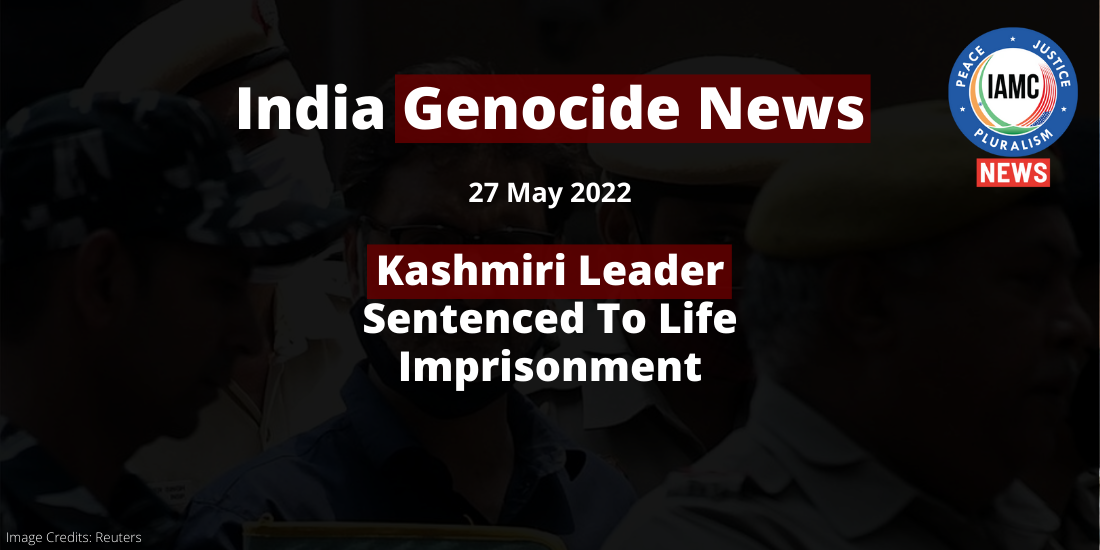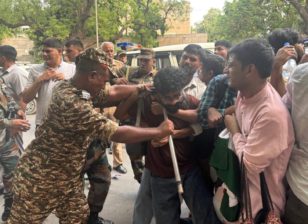Sham Court Trial Sentences Prominent Kashmiri Leader To Life Imprisonment
Kashmiri pro-independence leader Yasin Malik was sentenced to life imprisonment by Indian authorities in the latest attempt by the Modi regime to silence Kashmiris who protest against the government. To stop locals from protesting the verdict, Kashmiris have been subjected to yet another internet blackout.
“Court verdict in minutes by Indian kangaroo courts. Yasin Malik is the bravest man to challenge the Hitler Modi of this era,” tweeted Malik’s wife, Mushaal Hussein Mullick.
“Yasin Malik’s conviction despite not contesting charges against him is [a] serious moment. A Kashmiri has martyred himself saying India’s judiciary is bigoted and skewed against him,” tweeted Aakar Patel, Amnesty International’s India Chair.
Malik, who has been imprisoned since 2019, was convicted last week on false charges of committing “terrorist” acts, belonging to a terrorist organization, criminal conspiracy, and sedition. He has refused to contest the charges against him, calling them “fabricated and politically motivated,” and did not plead guilty, as the Indian news media falsely claimed.
“If seeking azadi [freedom] is a crime, then I am ready to accept this crime and its consequences,” Malik told the judge during his hearing.
Muslim Tourists Booked For “Intent To Cause Riots” After Praying On Taj Mahal Premises
In an unfairly strict punishment, four Muslim tourists were booked and locked up for hours after offering namaz (Muslim prayers) in a mosque on the premises of the Taj Mahal. All four accused were booked for “provoking with intent to cause riots.”
Ibrahim Zaidi, the president of the Intezamia Committee at Taj Mahal, stated that the Archaeological Survey of India’s (ASI) claim that prayers at the mosque inside Taj Mahal has been prohibited as per Supreme Court is “completely false.”
“Namaz has been offered at the mosque of the Taj Mahal regularly… We have, time and again, requested the [authorities] to give us in writing that namaz is prohibited and put up a notice board of the same. They have not done that,” he said.
“Since the accused are tourists and were unaware of what is allowed and what is not allowed here. If there are clear instructions on the timings, then people will abide by the rules.”
He added that prohibiting prayers at the mosque is unfair. “Neither do they give us clear instructions that namaz is not allowed, but then they will stop us from offering prayers as well.”
Hindu Supremacists Target Mosques With Violent Social Media Posts, Legal Claims
Hindu supremacists have flooded social media with violent posts and memes threatening the demolition of the historic Gyanvapi mosque in Uttar Pradesh state. Gyanvapi has been under relentless attack from Hindu extremists who claim that the mosque’s ablution fountain is a Shivling, or an abstract representation of the Hindu deity Shiva.
One common meme being circulated shows cartoon characters armed with weapons, hammers, and axes, threatening the demolition of Gyanvapi and other historic mosques. Other posts call for violence and incite hatred against Muslims. Despite the continuous hate-mongering, no police action has been taken against these Hindu supremacist trolls.
However, Muslims and other minorities who criticize Hindu extremists’ search for Shivlings through memes have been booked for “hurting religious sentiments.”
Other places of worship are also being attacked through India’s court system, which is now beholden to Hindu supremacist interests. A new plea targeting a mosque near the Diwan-e-Khas, a chamber in the historic Agra fort in New Delhi, claims that a Hindu deity is buried beneath the mosque. The plea further demands a survey to prove that the mosque should be reclaimed as a temple.
Hindu extremists have also claimed that the mausoleum of a Sufi Muslim saint in Rajasthan state was once a temple, arbitrarily claiming that there were “Hindu symbols” on the shrine’s walls.



